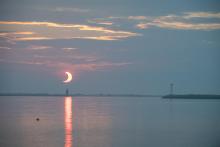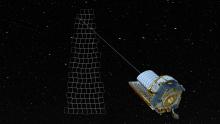UBC researchers led by cosmologist Douglas Scott are adapting open source software to help analyse the reams of data set to be produced by the recently launched Planck satellite.
Canadian scientists helped develop the rapid interpretation software for both the low and high frequency cameras onboard Planck, launched this week by the European Space Agency.
Scott is leading the development of so called 'Quick Look Analysis' software for Planck’s Low Frequency Instrument (LFI), which will operate alongside a High Frequency counterpart to cover different areas of the light spectrum. University of Toronto researchers worked in parallel with UBC scientists to develop software for the high frequency camera.
Planck will collect and characterise cosmic background radiation with unprecedented detail. The measurements should produce the best ever maps of the radiation field, providing an amazingly clear picture of the very early universe, just 300,000 years after the Big Bang.
But the cameras will produce a large amount of scientific data to process--with the LFI instrument alone producing more than 100 Gigabytes a year. Traditional data plotting and analysis packages like MATLAB and IDL wouldn't cut it.
Scott and colleagues are using a program called Kst, originally created at the University of Toronto by Barth Netterfield, which has developed into a powerful open source plotting program able to handle data sets containing millions of elements.
Planck is Europe's first mission to study the birth of the Universe, and is truly international in scope. More than 40 European and US scientific institutes participated in the construction of the instruments on board. The European Space Agency's project had international support, including from the Canadian Space Agency.
Musqueam First Nation land acknowledegement
We honour xwməθkwəy̓ əm (Musqueam) on whose ancestral, unceded territory UBC Vancouver is situated. UBC Science is committed to building meaningful relationships with Indigenous peoples so we can advance Reconciliation and ensure traditional ways of knowing enrich our teaching and research.
Learn more: Musqueam First Nation
Faculty of Science
Office of the Dean, Earth Sciences Building2178–2207 Main Mall
Vancouver, BC Canada
V6T 1Z4


